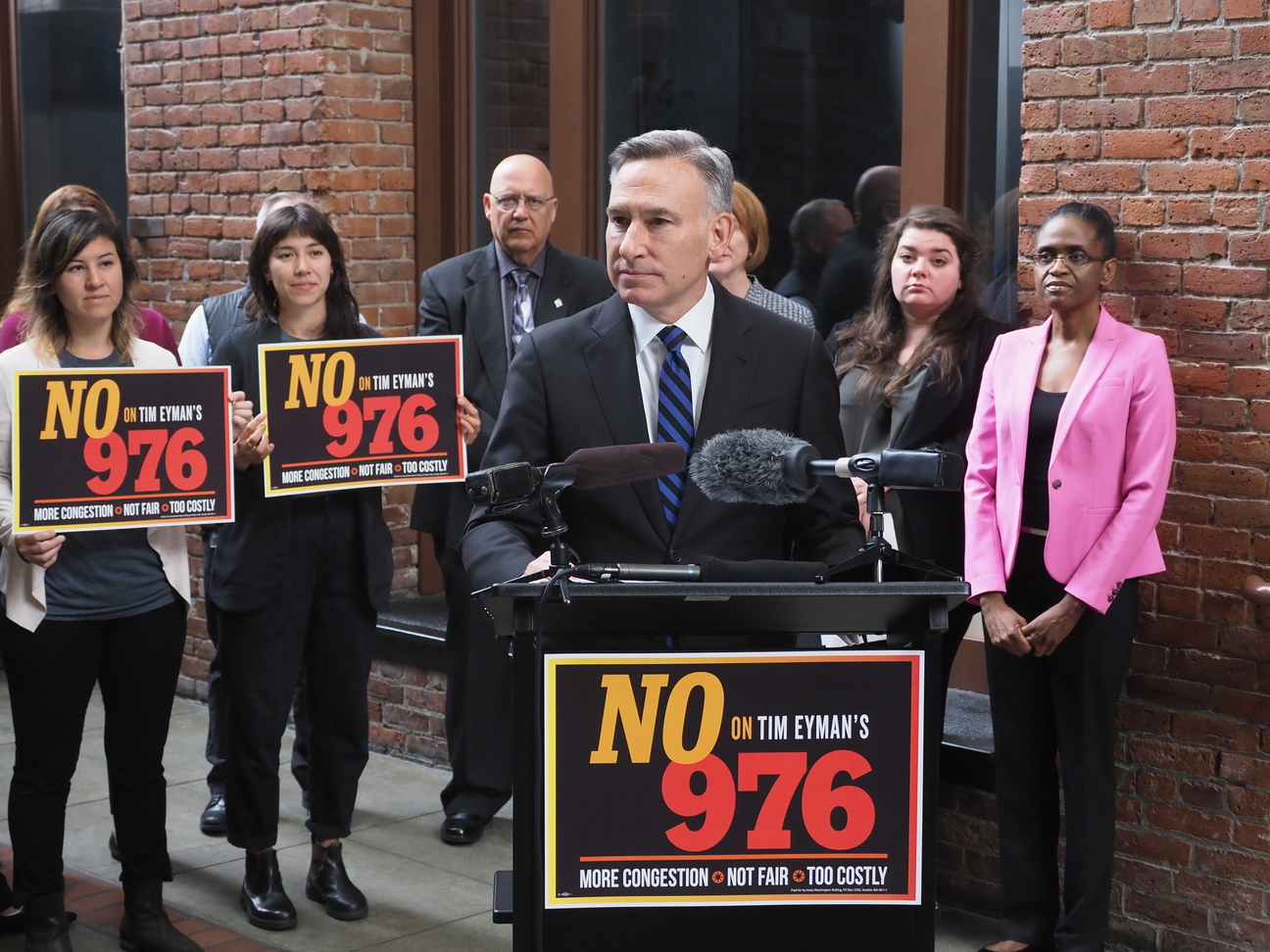Although many ballots remain to be counted, the battle over Tim Eyman’s Initiative 976 appears set to shift to the legal arena.
King County Executive Dow Constantine announced today he has asked Prosecuting Attorney Dan Satterberg to prepare a legal challenge to I‑976, which threatens billions of dollars in bipartisan, voter-approved transportation funding.
Constantine did not specify a timetable for commencing the legal challenge, but the lawsuit could be filed within days or weeks. Barring a court-ordered injunction, Initiative 976 would otherwise take effect in early December.
I‑976 is failing in King County, just like Eyman’s previous measures to slash vehicle fees (I‑695 in 1999 and I‑776 in 2002). Eyman repeatedly declared with absolute confidence that King County and even Seattle would support I‑976.
“The passage of I‑976 underscores the ongoing need for comprehensive state tax reform, but for in the short term we must clean up another mess that Tim Eyman has created for our state, our region, and our economy,” Constantine said.
“There will be many discussions in the weeks and months ahead to determine how to overcome the loss of safety and mobility caused by this irresponsible initiative, but the impact of I‑976 to transportation is – in a word – devastating.”
“We and the City of Seattle share a set a principles with which we will approach mobility reductions,” the Executive added, alluding to Seattle’s investment in expanded Metro bus service hours, an investment I‑976 attempts to repeal.
“These principles include: minimizing impacts to vulnerable populations, especially those with low-incomes and people of color; maintaining the ten and fifteen minute service frequency whenever possible; and minimizing overcrowding.”
Tim Eyman’s initiatives typically have constitutional defects, and King County will attempt to prove that Initiative 976 is unconstitutional in order to bar it from being implemented. Attorney General Bob Ferguson’s office will be in the awkward position of having to defend the initiative at the same time preparing for trial against Tim Eyman over his many campaign finance law violations.
Ferguson will likely direct his office to have separate teams working on each case that do not communicate with each other about the respective cases. The campaign finance unit will undoubtedly continue to handle the Eyman litigation while another team attempts to defend I‑976.
Other local governments — like Seattle — could potentially join King County in suing to overturn I‑976. Seattle has a lot to lose if I‑976 is implemented, and its city-level vehicle fee is voter-approved. Executive Constantine’s office provided this map showing all of the Metro bus routes that could be affected by the loss of funding coming from Seattle’s transportation benefit district:

“Our state’s tax system is inefficient, unfair, volatile, inadequate, and bad for business,” Executive Constantine argued. “Local governments have few tools at their disposal to provide all of the infrastructure and services on which successful communities and a thriving economy depend. Today, our economy is generating unprecedented prosperity, while at the same time governments are forced to cobble together transit and road systems from antiquated, inadequate and unpopular funding sources. We can and must do better.”
Executive Constantine is correct that we need meaningful and comprehensive tax reform. The Legislature needs to stop talking about reforming our tax code and actually start taking action. Until that becomes a priority, we will continue to be hamstrung by an inequitable, sales-tax dependent system of raising revenue that Tim Eyman can exploit to undermine people’s confidence in their government.
Executive Constantine is also wholly justified in moving forward with a legal challenge. Washington cannot afford Initiative 976. It’s irresponsible and immoral. It must be defeated. If it is not defeated in this election, it must be challenged in court. If the courts do not strike it down, there will need to be a legislative response to ensure that it cannot be implemented as designed.
The fight against I‑976 must and shall continue until I‑976 is vanquished.

